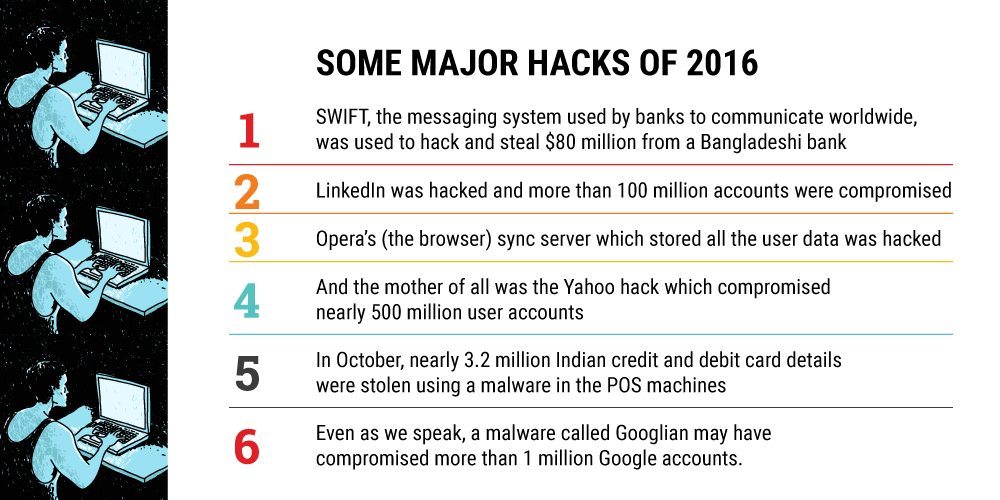“The internet is the first thing that humanity has built that humanity doesn’t understand, the largest experiment in anarchy that we have ever had.” — Eric Schmidt.
The Guardian recently called the internet a failed state. True, except that this seems to suggest that there existed order and purpose once.
The fact is the internet has always been a mass experiment in anarchy. Sure, it had idealistic intentions when it began: An open, transparent society where everyone participated on equal terms, information would flow free and humanity would flourish.
We increasingly fear and distrust the internet, and spurred by this fear, we may have unwittingly created the perfect environment for a government-controlled digital realm
But that ideal is far from being achieved. And the net as it is is turning sour for us today.
The year gone by was particularly bad for the internet — it became increasingly unsafe and untrustworthy for the average consumer. On one hand we have bandits who loot, harass and destroy lives in the virtual world. On the other, internet cops, who want to control and monitor everyone online.
Either way, we increasingly fear and distrust the internet, and spurred by this fear, we may have unwittingly created the perfect environment for a government-controlled digital realm. Therein lies the more insidious danger — of the net becoming an important tool to control and leverage for governments.
Where bandits rule
India is just beginning to face the reality of digital vulnerability. The recent theft of information related to millions of credit and debit cards is a sampler to what lies ahead as our digital ambitions take shape.
Data breaches have become so commonplace that they averaged about eight breaches a day in 2016 globally. With upwards of 3,000 hacks and more than two billion records compromised worldwide, it hasn’t been a good year for data on the internet.

On the other hand, fake news is increasingly impacting events in a post-truth world. It may even have helped propel Donald Trump to the position of the President of the US, purportedly one of the greatest countries in the world. In India, fake news has influenced mainstream media reporting (remember the Rs 2,000 note with supposed GPS trackers?) and incited violence (a fake video sent through WhatsApp may have sparked the Muzaffarnagar riots in 2013).
However, the net is not all about anarchy. Countries are seeking to use it as a political tool and a strategic weapon. Russian hackers’ strategic email leak may have influenced the US election. China has a well-oiled hack-machine serving its strategic purposes for a while now.
A big brother controlled internet?
An emerging narrative, therefore, is one of taking stronger measures to make the internet friendlier, safer and more trustworthy.
But, in our desperation to save the net, are we willingly handing over our freedom and forsaking our privacy to governments who sense an opportunity here? Make no mistake, governments are getting increasingly vocal about controlling how their citizens access and consume content on the internet.
China, for instance, has claimed success of its ‘internet sovereignty’ (euphemism for censorship) and is tightening its content censorship rules. Russia is looking to emulate this Chinese internet “firewall” and is potentially deploying Chinese technology to do so. Donald Trump’s campaign was vocal about potential restrictions on the internet — a section of the US law may even allow him to do that. Israel has called for a global coalition to force social media platforms to filter any content considered ‘objectionable’.

In this context, the Indian government’s small attempts at content censorship are also noteworthy. The most memorable such move was the botched attempt to ban pornography in late 2015. The government has even pulled the kill-switch on the internet in parts of the country, including Jammu & Kashmir, in the recent past.
The rise of malicious content on the net has forced the Indian government into some reactive policing. In a recent example, the Tamil Nadu police arrested social media rumourmongers for spreading false information about Jayalalitha’s health, who passed away on December 5.
In the longer term, an internet controlled and filtered is way more dangerous than one that is a free-for-all anarchy
As these incidents accumulate, the Indian government too will gravitate towards rules to censor and control content on the net in line with the global climate that seems to encourage it.
All of this is happening against a background of India going digital. While the India Stack and digital transformation will have serious benefits, this also means that millions of Indians will be sharing key personal information with the government and other institutions. Can we trust that this information will be safe and our privacy will be safeguarded?
In the longer term, an internet controlled and filtered is way more dangerous than one that is a free-for-all anarchy. We could end up with multiple realities of the web, siloed by countries, filtered by governments and rationed out as needed.
It’s the dystopian end-state we all feared and shouldn’t let happen.
Also read:
- FactorDaily’s interview with Ram Sewak Sharma, TRAI chairman, on net neutrality
- Redbus hacked or not, it is high time to discuss data breach disclosures
Subscribe to FactorDaily
Our daily brief keeps thousands of readers ahead of the curve. More signals, less noise.
To get more stories like this on email, click here and subscribe to our daily brief.
Visuals: Nikhil Raj Disclosure: FactorDaily is owned by SourceCode Media, which counts Accel Partners, Blume Ventures and Vijay Shekhar Sharma among its investors. Accel Partners is an early investor in Flipkart. Vijay Shekhar Sharma is the founder of Paytm. None of FactorDaily’s investors have any influence on its reporting about India’s technology and startup ecosystem.








